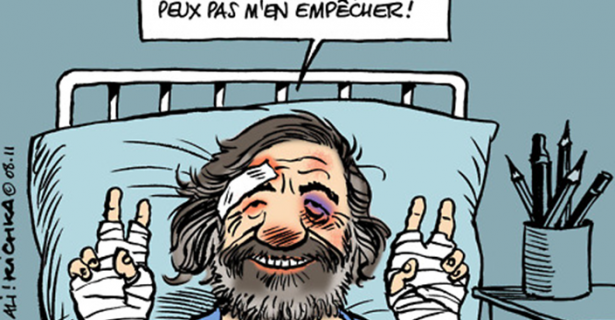The Arab Spring, beginning in the end of 2010, was unprecedented in many ways. The use of art and social media to spread the wave of protest across the region was of especial interest to me, as they are a part of my every day life and exposed me to the issues and the sentiment of uprising before the actual ‘start’ of the Arab Spring. I had heard Arabic songs countering the dictatorial regimes in the Middle East weeks before the uprisings had gained momentum. Notably, I had listened to a song by Tunisian Hamada Ben Amar, stage name El General, titled Rais Lebled (Mr. President), which had been released in November of 2010. Its lyrics targeted the president at the time, Zine El Abidine Ben Ali, uncovering the unemployment, hunger, and government corruption plaguing Tunisia. It has been acknowledged that musical artists such as El General played a prominent role in raising awareness of the situation in the Middle East and in inspire the citizens to non-violently fight against their government with words.
Ali Ferzat, a Syrian political cartoonist, has been taking a similar approach against the Bashar Assad regime following the Arab Spring. Though he has been drawing cartoons for over thirty years, his cartoons never were meant to portray a specific individual or situation. This enabled him to still promote the necessity of freedom of expression under the two Al-Assad regimes, that of Hafez and Bashar’s rule, without facing serious consequences from the government. During the onset of the Arab Spring, Ferzat began to directly mock and criticize the Assad regime. As a result, he was attacked brutally by masked men, where among other things, his hands were broken so that he could not longer draw about Al-Assad and his regime.
Ali Ferzat responded to this attack with humor and courage that resonates not only in his cartoons, but the interactions I had with him at the forum. Following his attacks, he released a cartoon, included above which reads, “it hurts when I laugh, but when I think that Assad is afraid of a pencil, I can’t help it!” Indeed, the attacks on Ferzat highlighted the powers of words to scare even the most feared people. When I spoke with Ferzat his courage was incredibly admirable. He never spoke of the attacks beyond his grateful surprise that it did receive international coverage. Recognition of his work on such a large-scale, he indicated, is what he hoped would come of his persistent satire of dictatorships over the past years. By using humor to minimize Assad’s legitimacy, he has empowered Syrians by showing them that these ‘powerful’ dictatorial regimes deeply fear the true power of the people.
Though, what I especially was inspired by was Ali Ferzat’s courageous outlook towards the future. After the hardships his family, forced to relocate across the region, his fellow Syrians, the beautiful ancient land, and he himself have faced, he continues to draw and continues to believe that a bright day for Syria, free of oppression, will come. His optimism was obvious from the onset of my conversations with him; he is still so filled with life and warmth that it is clear that he will not be broken. As I was concluding my conversation with Ali Ferzat, he asked that I let him know when I plan on visiting Syria. He sensed my confusion with his statement, and then added, “maybe not today, but tomorrow.”
Ali Ferzat was a speaker at the 2013 Oslo Freedom Forum and was the recipient of the Václav Havel Prize for Creative Dissent.

